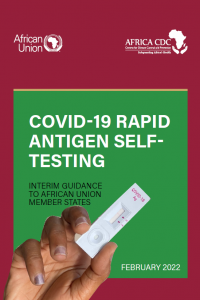

To counteract these gaps, the Africa CDC and partners have recommended the introduction, adoption and implementation of a COVID-19 rapid antigen self-testing to complement the existing facility-based testing protocols and improve access to SARS-CoV-2 diagnostic testing. The Africa CDC in collaboration with partners developed this interim guidance to provide strategic technical guidance to AU Member States and partners engaged in the COVID-19 response on the introduction and rollout of SARS‐CoV‐2 Antigen self-testing.This guidance addresses rationale, risk-based scenarios, practical considerations prior to adoption of the self-testing products, quality assurance, safety and ethical considerations, and data management considerations for COVID-19 self-testing. The Africa CDC recommends the use of rapid antigen self-testing within two key scenarios. The first includes testing for case identification within scenarios with a high risk of infection, including symptomatic cases and contacts of a confirmed case. The second scenario involves general screening within scenarios of low or unknown risk exposure allowing for self-care such as before gatherings with at-risk individuals and prior to participation in events involving members of different households. Within these scenarios, a positive test result indicates likelihood of current infection, while a negative test result indicates a lower risk of active infection, though it does not rule out infection altogether. All positive cases should be managed following the national COVID-19 management protocol of Member States.Distribution pathways for self-testing can include private sector distribution through pharmacies and private facilities to allow for self-care. Countries should also consider public sector deployment through secondary distribution of self-tests to confirm cases for further distribution amongst household contacts, and, where access would be improved, through distribution to symptomatic individuals and high-risk populations attending health facilities.Implementation of self-testing requires a comprehensive approach, including the use of only quality assured products and not using professional use tests for self-testing, ensuring the usability of tests, and managing the pricing to ensure broader access. At a system level, quality assurance procedures should be put in place and data management solutions should be offered to users for easy reporting of results, when feasible and required. While data visibility may, in the short term, remain a limitation of self-testing implementation, increased testing access has the potential to drive overall test demand and mitigate transmission. This COVID-19 rapid antigen self-testing interim guidance is recommended for all agencies engaged in the COVID-19 response in AU Member States. As this remains a rapidly evolving area, future guidance, including WHO guidelines and Africa CDC updates, will continue to inform this space. Africa CDC and its partners look forward to supporting the implementation of the guidance provided herein to consolidate efforts to enhance COVID-19 pandemic responses on the African continent and the global community at large.
0 Comments